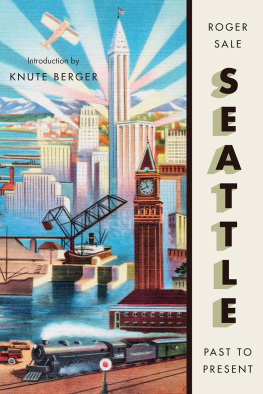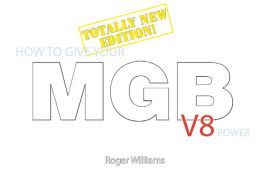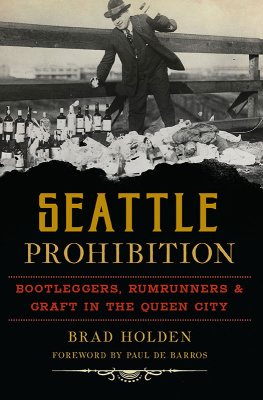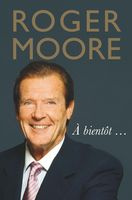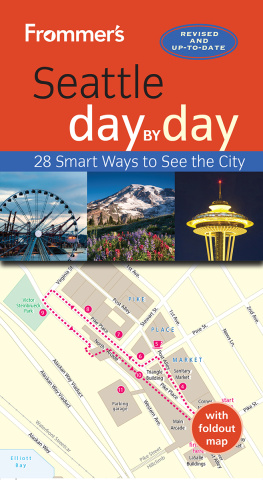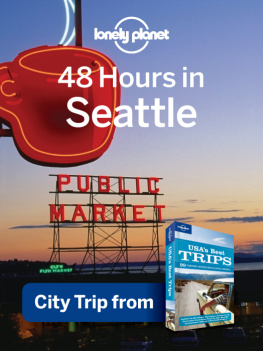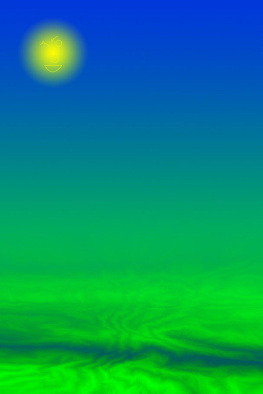PRAISE FOR PRIOR EDITIONS OF
Seattle, Past to Present
Among the best interpretive histories of a major American city. Los Angeles Times Book Review
Answers a fundamental question: How did this city happen to happen?... An impressive book, another attempt by one member of our shifting society to define, or at least understand, what makes this neck-of-what-used-to-be-woods tick.Seattle Times
Sale is a man of unquenchable gusto... of passionate interests, of delight in argument and with a great love for his adopted city. Affection (sometimes mixed with exasperation) infuses the book and keeps away any trace of the supercilious knowingness that has characterized much Ivy League writing about Seattle.Argus (Murray Morgan, author of Skid Road: An Informal Portrait of Seattle)
[Sale] has shaped here an expression of character and personalityhis own and his citysfrom which there is much to learn and much to enjoy.... Any serious student of Seattle or of recent urban history will now read Roger Sale, and with good reason. Pacific Northwest Quarterly
There are several effective ways of capturing the complexity of a citys past. This account of Seattles history by a professor of English is an excellent example of the merits of an individualistic, personalized approach.Western Historical Quarterly

SEATTLE
PAST TO PRESENT
ROGER SALE
Introduction by
KNUTE BERGER
UNIVERSITY OF WASHINGTON PRESS
Seattle
Copyright 1976 by the University of Washington Press
Foreword by Knute Berger to the 2019 edition copyright 2019 by the University of Washington Press
23 22 21 20 195 4 3 2 1
Printed and bound in the United States of America
All rights reserved. No part of this publication may be reproduced or transmitted in any form or by any means, electronic or mechanical, including photocopy, recording, or any information storage or retrieval system, without permission in writing from the publisher.
UNIVERSITY OF WASHINGTON PRESS
uwapress.uw.edu
LIBRARY OF CONGRESS CONTROL NUMBER: 2019947679
COVER ILLUSTRATION: Seattle, Glamour City of Washington, c. 1930, postcard courtesy Yesterdays-Paper.
ISBN 978-0-295-74637-1 (paperback), ISBN 978-0-295-74638-8 (ebook)
MAPS: (frontispiece) MacKintosh 1874 real estate map. (page viii) Downtown Seattle street plan, 1870s: Jesus (Jefferson, James) Christ (Cherry, Columbia) Made (Marion, Madison) Seattle (Spring, Seneca) Under (University, Union) Protest (Pike, Pine) (courtesy of the Library of Congress, Geography and Map Division).
The paper used in this publication is acid free and meets the minimum requirements of American National Standard for Information SciencesPermanence of Paper for Printed Library Materials, ansi z39.481984.
For Jack Brenner
CONTENTS
Photographs appear after p. 12, p. 108, and p. 204

INTRODUCTION
KNUTE BERGER
Should we read a history of Seattle called Seattle, Past to Present when the present named is forty-five years in the pastalready a part of history itself? Does Roger Sales classic study really tell a story of a city that is useful and illuminating today? The simple answer to both questions is an emphatic yes. But the story of how and why is a little more complicated and worth discussing.
When Roger Sales book came out in 1976, it followed in the large footsteps of what was then and still is the most readable history of early Seattle, Murray Morgans Skid Road. Published in 1951, a quarter century before Past to Present, Morgans book is still in print and the recommended introductory read to Seattles history and settlement roots. Its durability lies in the fact that it was written with the authors deep knowledge, storytelling ability, and wry humor. It has set a standard for subsequent histories.
Sales Past to Present was a kind of response to Skid Road. Morgan was a Puget Sound boy, born in Tacoma in 1916. I remember a conversation with him many years ago in which he mentioned that as a young lad, he had sat on the knee of pioneer patriarch Ezra Meeker. This astonished me. Meeker came out on the Oregon Trail, started the states hop industry, and was part of the cornerstone of Washingtons settlement. Portraits show him as a biblical prophet-like figure with flowing white hair and beard as if hed just come down from a mountaintop to deliver a divine message. Meeker lived to be ninety-seven; he came out with oxen and lived long enough fly over the region in an airplane. He died in the early 1920s. That Morgan had met him was a startling reminder of how close our early frontier history is to us. Skid Road grew out of that. Morgan was an author intimately familiar with the frontier milieu out of which cities like Tacoma and Seattle sprang.
Roger Sale was not as steeped in mossback lore. He was often thrown by the fixations, customs, and fond memories of locals, as many transplants are. But this detachment is crucial to a book that is much more than Skid Roads sequel. It is its equal but a contrast in approaches. While Morgan was a local journalist, Sale was a transplanted academic, an observer, and a literary critic. He purposely strove to write a very different book, yet it is one no less of the Pacific Northwest for Sales upbringing on the Eastern Seaboard. Indeed that is one of the works strengths. Sale represents the migrant, not unlike Meeker himself, who found his way to this strange corner of the country and put down roots.
A natural question that follows for those on this migratory path is, Where am I? Sale arrived in 1962the year of Seattles Worlds Fairto take a job teaching in the English Department at the University of Washington, where he stayed for nearly four decades. He came from Amherst College in Massachusetts and picked Seattle in part, he said, because it was far away from the East. He wanted to land at a large public university; he wanted a town with a good school but not a college town. And the University of Washington fit that bill.
When he arrived with his wife, Dorothy, and their two children, he was deeply curious about his new home. The big cities with which Sale was acquainted were New York, Philadelphia, Boston, and Washington, D.C. Seattle was something else altogether. Sale likened cities to trees with complicated systems of roots and branches. When I first came to Seattle, he wrote, I wondered where the city was. There were so few places where one could find a crowd, city excitement, city danger. I was, of course, looking for a maple or an oak, having never seen a rhododendron.
He set up camp in the Madrona neighborhood. In the 1960s and 70s parts of the neighborhood were in declinea Craftsman home there was pretty affordable even before the Boeing recession of the early 70s. It sat on the white side of a redlined neighborhood adjacent to the Central Area, where most of Seattles relatively small African American community lived. It was also an area that might not have appealed to some white Seattleites at the time. Seattle was a largely white city (nearly 92 percent in the 1960 census) and still segregated through redlining and the legacy of housing covenants. The citys economy lagged, and open housing drove some white families to the suburbs. His immediate neighbors, Sale said, were university and Group Health types, meaning broad-minded urban professionals and those embracing the innovative Seattle healthcare cooperative that some thought akin to so-called socialized medicine. It afforded Professor Sale a cozy nest from which he could gaze at hedges, holly, and songbirds while he wrote. It had a garden for him to tend and was in a part of town with endless places to walk and explore nature within the city.



